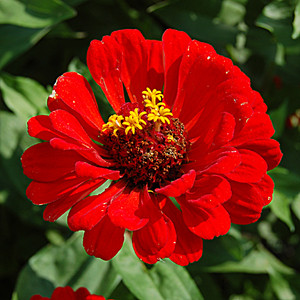 Below is a Sample Letter to a Plant Vendor from a Citizen. Note: This addresses the current issue of Bees and Pesticides and requests action.
Below is a Sample Letter to a Plant Vendor from a Citizen. Note: This addresses the current issue of Bees and Pesticides and requests action.
Dear Plant Vendor:
Begin with a personal note and state the purpose of your letter: As one of your long-time customers and a gardener I am concerned about the lack of available of organically-grown ornamental plants for sale commercially. I hope to persuade you to carry them in future so that I can continue patronizing your business. Further, I hope you will no longer carry for sale products with active ingredients from the neonicotinoid insecticide group. I believe that your business would benefit by making these changes that I recommend.
Follow up with background information that details the problem:
- Bees contribute to production of a significant number of food crops — over 30% — that we consume regularly. They are essential components of our horticulture and our agriculture yet their populations are under threat and in decline.
- Scientific evidence indicates that there is ongoing harm to bees and other pollinators from exposure to pesticide chemicals especially those from the neonicotinoid insecticide group.
- There has been a recent decline in pollinator populations and a crisis of unsustainable losses in managed honey bee colonies in the USA and other parts of the world (Brown & Kegley, “Running the risk, Pt 1: An overview of honey bee risk assessment basics,” American Bee Journal, Oct. 2014). Chemical pesticides have been associated with this decline.
- As a California pesticide regulator acknowledged there is inadequate regulatory protection of pollinators from chemical pesticide hazards.
- Scientific evidence from exposure to mixtures of chemical pesticides is not required by regulatory agencies for assessing the hazards to bees yet this is the chief way that bees under field conditions encounter pesticides.
- “Pesticides have medical impacts as potent as pharmaceuticals do, yet we know virtually nothing about their [multiple exposure] synergistic impacts… ” (Winston, M., “Our bees Ourselves, The NYT, 7-15-14).
- The recent loss of pollinators has prompted action at the highest government levels with President Obama announcing in June 2014 the creation of “A Federal Strategy to Promote the Health of Honey Bees and Other Pollinators.” In conjunction with the announcement, The Washington Post carried a full page article on threats to bees, with the title “We’re all getting stung.” The author advised that to help bees we humans should “Avoid using pesticides; [and] eat foods grown without them.” (TWP, June 24, 2014)
- Neonicotinoid insecticides (neonics) are nerve poisons. They act as systemic pesticides in plants that readily take up these chemicals through their roots. Once neonics are sprayed on the soil they can continue to be available to plants through the roots even if no additional spraying takes place. Once in the plant these systemic chemicals spread to all parts of the plant including its pollen and nectar. (Texas A&M AgriLife Extension, Insects in the City: What is an Neonicotinoid?” April 8, 2013)
- The most commonly used neonicotinoid insecticide, Imidacloprid persists in the soil anywhere between 30 days to more than 100 days. Imidacloprid has been detected in surface water and ground water (Fossen, “Envir. Fate of Imidacloprid” CA Dept of Pesticide Reg, April 2006, April 8 2013)
Provide Recommendations:
I urge your company to take the following steps:
- Listen to the increasing numbers of home owners and gardeners who care about preserving pollinators and are asking for organically-grown sources of plants. You can help your customers and your business by making such options available to them.
- Offer customers a choice of clearly labeled plants that have not been treated with any chemical pesticides and have been grown organically, especially for those plants that attract bees with their nectar and pollen.
- For all plants that you offer for sale-only buy from nurseries that identify which pesticide products have been used on their growing stock and when the applications took place also indicate when the plant has been grown on soil treated with Imidacloprid, other neonicotinoids (neonics) or systemic insecticides. Have previous pesticide exposure information available on the plant label.
- Refuse to carry any neonicotinoid-containing products for sale by your company. Do not carry ornamental plants that are attractive to bees if they have been treated with neonicotinoids.
- Initiate the recommended changes so that gardeners who care about pollinators can continue to patronize your company and to recommend your company as one that helps protect pollinators.

